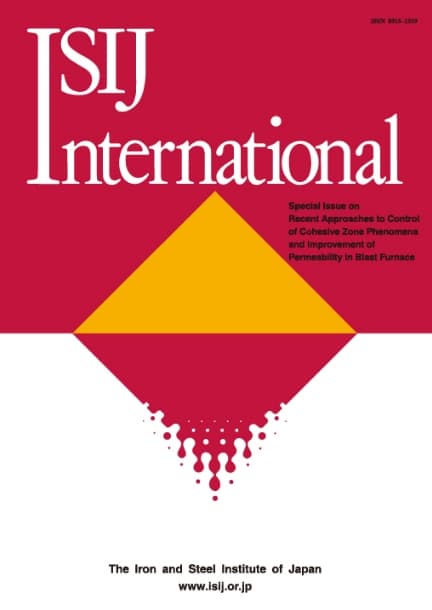Simultaneous Decarburization and Denitrogenization of Molten Iron with Vacuum Suction Degassing Method
Mehdi Ahmadi Najafabadi, Satoshi Kanegawa, Masahiro Maeda, Masamichi Sano
pp. 1229-1236
Abstract
A kinetic study has been made on simultaneous decarburization and denitrogenization of molten iron in low content ranges by using Vacuum Suction Degassing method (VSD method). A porous Al2O3-SiO2 tube was immersed into molten iron. Internal pressure of the tube was reduced to remove gaseous products from the tube-molten iron interface. The initial carbon and nitrogen contents were in the ranges of 0-1000 ppm and 50-100 ppm, respectively. The initial oxygen content was below 50 ppm. The atmosphere of the bath surface was Ar (1.01×105 Pa). The experimental temperature was 1853 K.
The VSD method can greatly increase the rate of denitrogenization as well as decarburization, and the carbon and nitrogen contents can be decreased to very low values. The decarburization rate constant increases with increasing gas permeability of the porous tube and with decreasing its internal pressure. The decarburization at higher carbon content is largely affected by the dissociation reaction of solid oxide of the tube. The decarburization enhances the denitrogenization considerably. The denitrogenization reaction rate is strongly dependent on gas permeability of the porous tube. A mixed control model is applied to explain the denitrogenization at the porous tube-melt interface. It is found that the denitrogenization rate is controlled by the mass transfer in the porous tube wall at lower permeability and mainly by the chemical reaction at the tube-melt interface at higher permeability.
Readers Who Read This Article Also Read
Tetsu-to-Hagané Vol.57(1971), No.11
ISIJ International Vol.34(1994), No.8
Tetsu-to-Hagané Vol.57(1971), No.11










